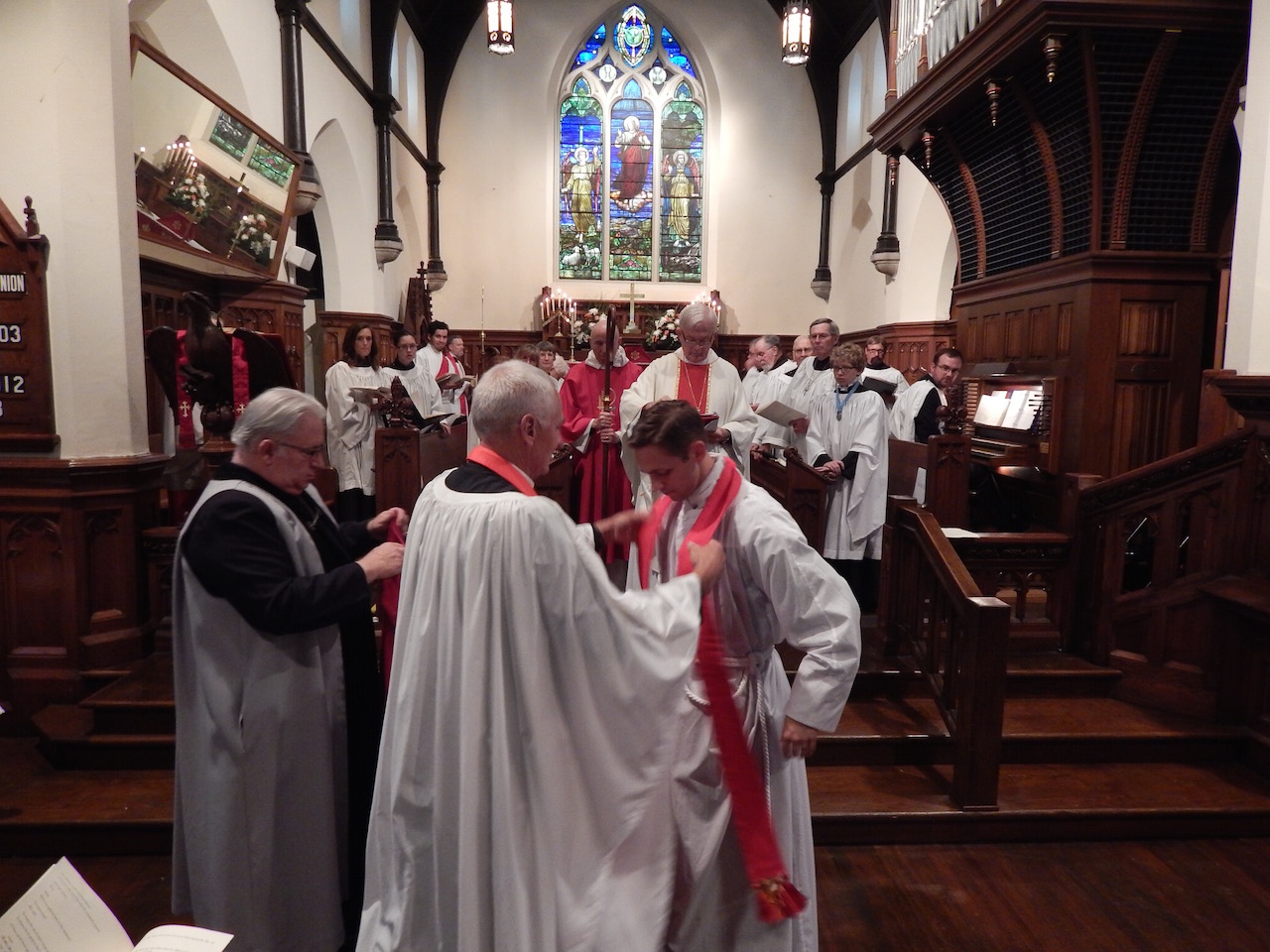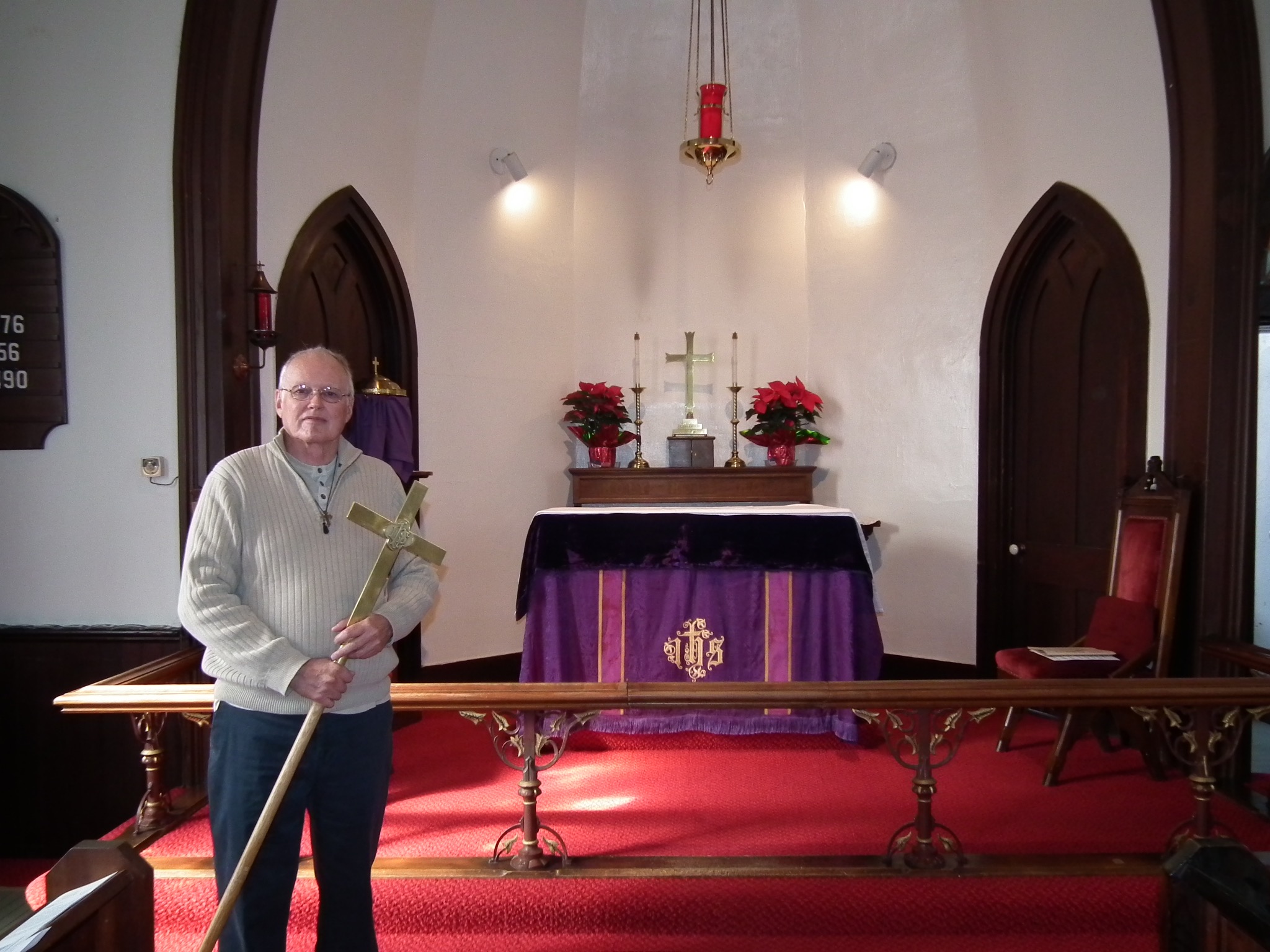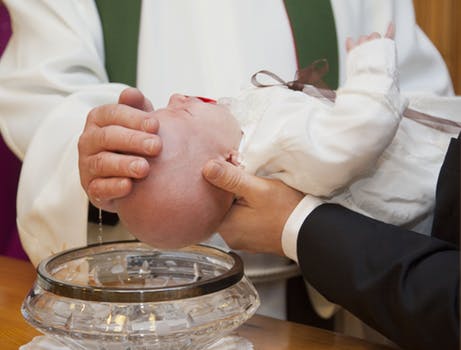
By most objective standards of measurement, it can be argued that the Christian Church is increasingly dominated by women. Whereas women still strive for parity in secular society, it seems the shoe is on the other foot when it comes to organized religion. It’s not just a matter of membership, either. In areas long the domain of men by custom or rule, sacerdotal and administrative functions are increasingly performed by women. The leaders in this respect are of course the liberal Protestant denominations, because unlike the Roman church, they lack rules against female leadership. Even in the evangelical and charismatic branches of the Church, however, women are more than likely the ones who are taking charge and taking over, much to the consternation of the few men left.
There are those who would say that this is nothing to be upset about, that perhaps women will do a better job than men, who have no doubt made a hash of things. But it’s important to remember that Church membership and ministry are not matters of rights, but of opportunities to suffer for the cause of Christ, and if men are not carrying their share of the burden, something is wrong. In the Bible, periods of spiritual decline were usually characterized by the worship of female goddesses and a general sexualizing of the worship experience, and if the same principle holds today, that speaks volumes about where we stand as a Church. The inevitable result of this trend is a criticism of women, with the charge that their prominence leads to a religion that is marginalized and unattractive to men. The possibility remains, however, that the ascendency of women is a consequence and not a cause, and it would be more fruitful to look at all the actors in the drama before blame is assigned or accepted.
The first hint of an explanation for all this came from my own experience. I managed to waste nine years of my life between the time I first “realized my election to God in Christ Jesus,” as Oswald Chambers so eloquently puts it, and the time I learned to cooperate with the Holy Spirit. Wherever I would live during that period, I would look up Christian fellowship, attend, and become terrified of what I saw. If I had to become like the other men present, I wanted none of it. I didn’t want to be defined by the constraints of faith, but rather set free by the promises it carried. Yet one and all seemed to be travailing under a set of rules that try as I might, I couldn’t submit to. Eventually all that changed when I met someone who was both a faithful Christian and a real man, and I got the guidance and encouragement I needed. I wasn’t sure what the change was, but what was hard became easy, and I was able to succeed where before I had failed. I attributed my delayed conversion to personal obtuseness, and thought no more about it. It was not until I realized that my three sons were also going through much the same trauma that I entertained the notion that perhaps there are real, gender-based tendencies that need to be addressed if the Church is going to find men as receptive as women to the Christian Gospel.
This is how I figured it out. I have five kids, three boys and two girls, with the genders alternating. Beautiful. As far as the girls are concerned, they took to the Christian experience like ducks to water. As these two were growing up, they apparently listened in Sunday school, during family prayer times, and later in church on their own and gave their hearts, minds and bodies to Jesus Christ. They are integrated, gracious and beautiful girls who are a delight to their earthly father, and no doubt to their heavenly father as well.
Then there are my boys. Raised the same way, exposed to the same message, given the same treatment in every way, they’ve had substantially different reactions to the Gospel. The oldest claims no Christian faith, although he has a very high doctrine of moral behavior and is not at all given to criticizing others who do believe. The middle boy is off to seminary, like me, but even though he is a pious, self-controlled young man, he nevertheless evinces some screwy ideas about politics and social organization that I, too, held at his age. The third boy, who at times espouses Christian faith, nevertheless seems to have trouble reading his Bible and actually doing what it says to do. Or not do. So before boys #2 and 3 moved away to the East Coast, I convened what I called a Male Summit to ask them about their experience with the Lord to date as well as how I, as their father, either helped or hindered that encounter. I figured I should clear up any misunderstandings while I had them in my house one last time, as they were not doing as well as my girls.
So here’s what I did. I prayed about finding something we could read and comment on that was written by some third party. Like clockwork, I came upon three consecutive chapters in Francis Schaeffer’s book, Death in the City, which seemed to fit the bill perfectly. I asked the oldest to read the chapter entitled, The Man Without the Bible. The middle boy was asked to read the next chapter, The Justice of God. The youngest was given the last chapter, The Two Chairs. Each chapter addressed something that each boy had expressed misgivings about. In the case of the oldest, it was the existence of God and an absolute moral imperative in the universe. Schaeffer quotes Paul in the opening chapters of Romans where he makes a case for man being under a general wrath from God, not because he has disobeyed special revelation, but because man can see evidence of the divine both in himself and in the created order, yet does not follow the trail of evidence to its logical conclusion. The middle boy, about to embark on the troubled waters of a modern seminary indoctrination, has articulated some libertarian political and social feelings. Although this is forgivable in the young, it doesn’t square with a Biblical view of man who, when left to his own devices, does not tend to good but to evil. The last chapter contains a cogent metaphor that drives home the point that intellectual credence is trumped by behavior every time. If we say we believe something, we need to back it up with consistent action. The kids were asked to deliver a book report, if you will, not necessarily accepting or liking what they read, but just being able to convey Schaeffer’s argument.
The big day rolled around, and book reports were delivered. What stole the show, however, were their responses to the question about where they were vis a vis the Gospel. All three, it turned out, had had a spiritual encounter with the risen Lord, had experienced a sense of cleansing and well-being, yet each in turn had then embarked upon a process of trying to maintain those sensations even as they dissipated. This surprised me, as I was not aware that boys 1 and 3 had had such an encounter. Further, I was surprised that boy 2 had struggled in his relationship with the Lord, although not to the point of despair. Thus, all three of my male children had experiences not unlike mine where the bliss of divine encounter turned into a struggle to maintain the mountain top sensation through works, and eventually a grudging recognition of the truth of the Gospel while experiencing none of its power or liberty. The question now became, did we all share this experience because we’re related by genetics, or by gender?
A pattern was becoming clear. Each felt the Christian life consisted of efforts to please the Lord so that the Lord would abide in them. I felt this for nine years, and it was only when I was discipled by a successful Christian man that I learned I didn’t have to do anything to remain where I had been put by the Cross of Christ. I was doing too much, and here were my sons making the same mistake. Apparently I never told my sons what this man told me, that I had made all the decisions I needed to make, I just needed to grow. We had, one and all, concluded that as the feeling of rapture faded, as it must, God was displeased with us, and we needed to strive harder to maintain it. As men go through this cycle of renewed effort, necessary fatigue and increasing guilt, it’s no surprise that many fall away. To some extent it’s a measure of character that they renounced the whole endeavor, rather than continue with some desultory religion that imposed rules but didn’t offer true freedom. What none of us realized at the time was that we were simply barking up the wrong spiritual tree. God will not tolerate those who try to achieve moral purity through anything but appeal to the Cross, nor does he tolerate those who, no matter how sincere, try to reform themselves and make themselves factories of good when in fact “no good thing dwells in my flesh.” So if sincere but misguided efforts at living aright are not in order, then what is?
Continued talk brought us to the part of the last chapter of Schaeffer’s book about the two chairs where he talks about the nature of the Christian life. I quote:
“The difference between a Christian who is being supernatural in practice and one who says he is a Christian but lives like a materialist can be illustrated by the difference between a storage battery and a light plug. Some Christians seem to think that when they are born again, they become a self-contained unit like a storage battery. From that time on they have to go on their pep and their own power until they die. But this is wrong. After we are justified, once for all through faith in Christ, we are to live in supernatural communion with the Lord every moment; we are to be like lights plugged into an electric socket.”
Here’s the first real insight. No matter how hard a battery tries to maintain current, it will eventually run out. By design. This is a struggle that we are simply not to undertake at all. In addition to doing too much, it can be argued that there’s something good that men often fail to do. Francis continues two pages later:
“The Bible tells us plainly that Christ promises to bear His fruit through us. In Romans 7:4 Paul says a very striking thing: ‘Wherefore, my brethren, ye also are become dead to the law by the body of Christ, in order that ye should be married to another, even to him who is raised from the dead, in order that we should bring forth fruit unto God.’ This verse says that each of us as a Christian is feminine. At conversion we are married to Christ, who is the bridegroom, and as we put ourselves in his arms, moment by moment, he will produce His fruit through us into the external world. That is beautiful and overwhelming. Just as with the natural bride who gives herself to her husband and puts herself in his arms, there will be children born into a home. The bride can’t just stand with the bridegroom at the wedding ceremony. She must give herself to him existentially, regularly and then children will be born to him, through her body, into the external world.”
Here is a second reason real men miss the boat, but to understand it, we have to be willing to accept that men and women are not only physically different, but poles apart in terms of how they approach relationships in general and intimacy in particular. Is it possible that what is hard for one gender comes easily to the other? Is it possible that the weakness of one sex correspond with strengths in the other, so that united we might become a complementary whole? If you allow for these possibilities, then you may be able to accept the following argument. Men in general don’t want to be perceived as feminine or reactive. We want to be masculine, and at least with regard to the opposite sex, that means being proactive. Although modern culture has to a large degree dismantled these notions, I submit that there is a core of truth that transcends time and culture and must be acknowledged. I am not arguing that men and women are not equal. I am arguing that they are not equivalent. Given the text from Romans 7, I ask, what man wants to be feminine? What man has the first clue what it means to be spiritually feminine? While women have traditionally been asked to cede their will and give themselves in love and trust to the ministrations of another, men, real men, have no such experience or inclination. Almost all our natural motivation and socialization must be set aside so that we can embark on this new life of spiritual intimacy with another, a man no less. Any reversion to those tricks which work in the world and society will do nothing but get us into spiritual trouble with the new authority in our lives, the living Jesus. And just how do we give ourselves existentially and repeatedly to this man? As Daws Trotman of the Navigators discovered, through prayer, Bible study, fellowship and witness. There has to be a deliberate discarding of old knowledge, suppositions and reactions, and the systematic acceptance of the new. Any natural independence, self-reliance, common sense and spontaneous improvisation, things which worked in the former life to good effect, must pass under the rod of judgment and probable dismissal.
In other words, if men treat their relationship with Jesus the way they treat relationships with women, they will be headed for trouble. Put another way, the more successful a man is in social contexts, the more of a failure he’s bound to be in spiritual. By convention if not by nature, men are the initiators in their dealings with women. It is they who are to approach, they who are to initiate, they who propose, they who provide materially, and of course, they who set the sexual agenda. Women, by contrast, and excuse the generalization, find their fulfillment in the relinquishment of their independence, emotions and bodies to their husbands. I would argue that objections raised by this statement have more to do with the low performance of husbands than any inability on the part of wives. That objection notwithstanding, what is expected and effective with a woman is disastrous when it comes to the Lord Jesus Christ. Many of the things that my sons and I thought we had to do to maintain the bliss of our new fellowship with Jesus were to be done by him, and not by us. Frankly, the only task left to us was that we stop doing things we mistakenly thought we were to do, and let ourselves become more sensitized to the love language of Jesus.
I had already read this last chapter of Schaeffer’s book, yet its relevance to all male converts was lost on me until we read it together in our meeting. It was as if scales fell from my eyes. I knew men and women were different, but it never occurred to me that men faced the specter of a major overhaul to a greater degree then women. No wonder men fall by the wayside! First, it’s not for lack of trying, but for trying too hard! Then we fail to do the simple things that any romance requires, and that is to immerse ourselves in the ministrations of our partner apart from our own energies. Not the first time men have underperformed romantically.
So what’s to be done? I would posit that men, more than women, need to be discipled, to be steered away from what comes naturally, and to be steered towards what is at first unnatural, to learn how to give themselves existentially and repeatedly to Jesus. All this would be more obvious if the Church were clear about what it is asking people, both men and women, to do in terms of responding to the Gospel. If there’s one thing that separates Christians, it’s this very thing: what does God want us to do? Some say works, either of omission or commission (Baptists and Romans, respectively.) Some say we’re to attain knowledge (dispensationalists, you know who you are.) Some say nothing at all (Episcopalians and other mainline liberals.) If existing Christians are not clear about what God wants us to do or not do, how can we help new converts?
The simplest way to package our message is to say that there are some things only God can do, and these we should not attempt. Further, there are things that God can do but won’t, because he wants us to do them. To wit, we cannot justify ourselves. We are collectively and individually guilty of moral trespass against God. There is nothing we can do about this; it requires a divine solution. In order that our moral guilt be expunged, the Father sent his Son, Jesus of Nazareth, to the Cross in order that he might suffer the punishment our sins merit, which was a tortuous death. Only the sinless can take the sin of another, and that’s what happened on the Cross. As of Good Friday, all sins of all people from all time have been placed in Jesus and covered by his blood. There is no limit to the power of the cross: God has justified all humanity, and there is no longer any impediment to our communion with him from his perspective.
Man has another problem, however, and that is our continued enmity with God. Paul speaks of a coming wrath from which all need salvation. We are powerless to act in keeping with our newfound legal status of moral purity, and we tend, as before, to moral wrongdoing and wrong being. Rather than strive to reform ourselves and act in keeping with our legal status, we need to realize that we cannot do it, but the job must get done nonetheless. We are to give up striving, and ask another to do the job for us, in us, none other than the same Jesus of Nazareth who died for us. Though he died a real death, he was also raised to life, and reigns as Lord in heaven. He will come to us in the person of the Holy Spirit and animate us in genuine moral purity if we will let him. The only catch is that he brooks no competition, and we must cede our will to his if he is to abide in us and we in him. It’s not a matter of performing works that please God, as my sons and I tried, but rather a cessation of works altogether, where we not only admit but celebrate our inability to do anything right. We are to stop worrying about doing and start worrying about being. As Oswald Chambers says, are we willing to be stripped of any trapping, any merit, any offering, and just present ourselves naked before our Lord?
So it’s easy to see why men have trouble with the Christian life. As my oldest son says, “I am not constitutionally suited to the Christian life.” To this I would reply, “No man is, until his constitution is changed.” And, I might add, until our definition of that Christian life is also presented accurately. In any event, the problem with the Church is not women. Women are not to be criticized for taking over. Rather, let’s realize that they’re merely filling a void that they perceive in terms of the presence and behavior of men. To vilify women is to miss the point, and criticize the manifestation of a problem, rather than the root cause. Our time would be much better spent reforming the way men are indoctrinated in the Christian faith, so that they would assume their rightful role as workers and leaders who are pulling their own weight in an operation that’s designed to bring out the best in both men and women.
Presented properly, the claims of the Gospel should be very, very attractive to real men. Though at present our message is one of vague, sentimental niceness, imagine it reformed to what it should be: a clash of kings, kingdoms and armies under perfect authority and control. Be clear about the product you are selling, and the attraction will be manifest to all, especially men. Then others won’t have to do what my sons and I have done, wasting precious years experiencing middling successes and painful failures. A revised approach to male ministry will not only reduce personal suffering, it will transform the appearance of the Church as a whole. As it is, it doesn’t scare anybody, most notably the Devil. What the Church needs is some men with, in the words of Oswald Chambers, a distinct family likeness to Jesus Christ. Jesus was the greatest fighter of all time. Two things distinguished his technique. First of all, he chose to fight the proper opponent. He was never distracted by people who were doing the Devil’s bidding. He went to the top of the organizational chart and took on the chief troublemaker. Secondly, he fought for a permanent solution. He didn’t try to patch people up so that they were better. He replaced them with his own Spirit so that they could be what they were in the beginning: holy. For all who despise the partial, the temporary, the wrong, this Gospel is for you. God doesn’t do things many ways, in an attempt to find a fitting solution. He does things once, correctly, and perfectly, so that they need never be repeated. The chance to be involved in a struggle like this should animate anybody, and especially men, who want their lives to be dramatic and meaningful.









Recent Comments